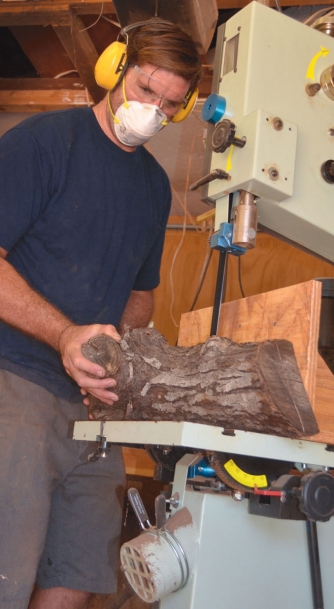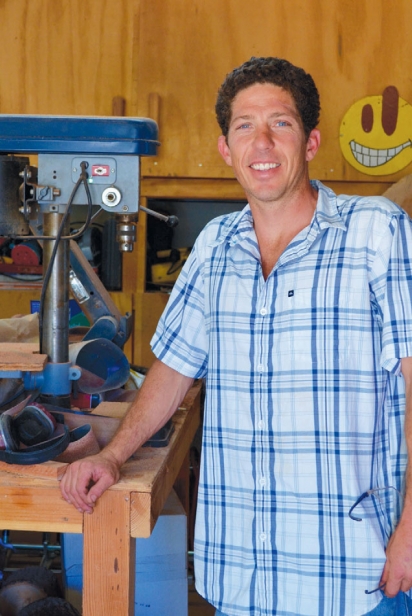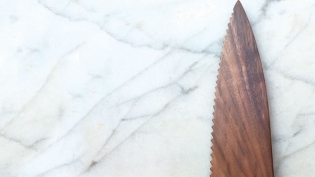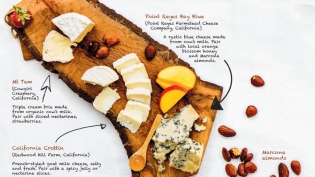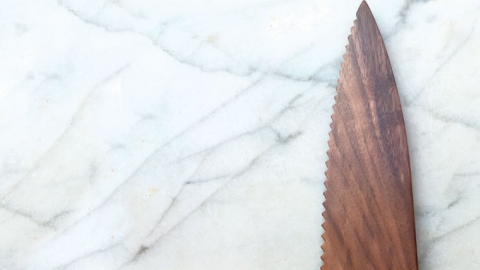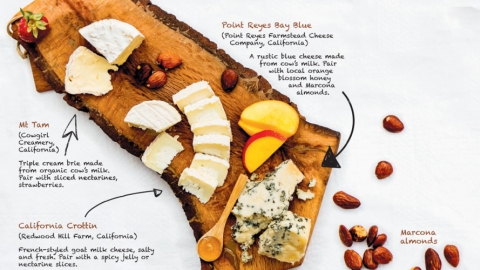Local Artisans Give Trees a New Life
Artful new life awaits thanks to craftsmen
When my kids were young, our nightly routine for a time included reading Shel Silverstein’s 1964 children’s book The Giving Tree, a bittersweet tale of a tree that gives and gives of herself over the years to the little boy she loves. Until she’s just a stump. Still she gives, becoming a seat for the now-elderly man.
The book signs off: “And the tree was happy.”
Silverstein’s story kept coming to mind when I met Joshua M. Mariani and Josh Rood of Ojai Oaks Fallen Wood Studio at their Meiners Oaks workshop. I’d like to think the fallen trees these two craftsmen turn into artisan charcuterie/cheese boards, furniture, bowls and vases, among other things, are happy.
Through Mariani’s and Rood’s handiwork, these giving trees and reclaimed wood are repurposed into functional works of art. Not just for “the boy” but for everyone.
In the studio, which started as Rood’s garage, woodworking equipment and wood in various stages of the creative process fill the space. There’s also a wall-height rack outside with curing wood.
Mariani has been in construction for 20 years, so he was no stranger to working with wood when they started in 2010. He was doing finish carpentry for Rood’s family business, Ojai Termite & Pest Control, and they were using lumber from other countries to build decks.
The two decided to give a new life to wood that’s already here. And the idea for Ojai Oaks Fallen Wood Studio was born.
Early projects were on the lathe: turning bowls, plates and containers, primarily from oak, given away to friends and family. They sold a few pieces here and there and formally launched the business last year with ever-growing interest from restaurants and retailers.
Running the termite business and having a family, Rood fills in the crevasses of his schedule with woodworking. Mariani, who lives in Ventura, works at the business pretty much full time.
“When I get to get in here, this is where I’m one with nature,” says Mariani of the studio. “This is where the trees speak to me and I get to speak to the trees and I get to be that hugger that Ojai raised.”
There’s a community aspect to the business. People will call and say “a tree fell and it’s yours if you want it,” says Rood. (Friends take the cast-off sawdust for their chickens or gardens and business owners put in their requests for pieces.)
At Beacon Coffee Company in Ventura, the cappuccino or latte and pastry you order arrive on an Ojai Oaks Fallen Wood tray. Mariani is also doing all the woodwork for the upcoming Ojai location, says Jennifer Wheir, who owns Beacon Coffee Company with her husband, John.
“We sourced a few large reclaimed redwood pieces from Santa Barbara for the tables and a portion of the seating. The rest of the wood came from my grandfather [a woodworker on the East Coast],” says Wheir. Some of the wood is cherry from a tree lost to a storm or disease that was in Wheir’s grandparents’ backyard. “This wood, along with many other kinds, will be the finishing wood in the new café space … and as serving platters,” she adds.
This year, Mariani and Rood learned an over 100-year-old oak tree had fallen on Creek Road behind Persimmon Hill in Meiners Oaks. They hired Greg Rents equipment rental in Oak View to pick it up and have it delivered to Bjorklund Ranch in Goleta for milling.
“While having it milled into three-inch slabs, we were told it could take a year to 18 months to dry correctly and flat if we put three-quarter-inch slats every 10 inches and ratchet straps to hold it all together. Then wrap the whole log [12 slabs each] in stretch-tight plastic to let the moisture escape slowly,” Mariani explains.
The tree that fell behind Ojai Termite? It’ll sit for nearly two years to get some character before being hauled to the studio, Rood says.
From the beginning, speed has not been the name of the game. They wanted to do it the “old-school way,” meaning to let the natural beauty of the wood shine through and keep the process as eco-friendly as possible.
To make a cheese platter from start to finish—once the wood is cured—takes a minimum of three days, says Mariani.
The multi-step process involves using a joiner and planer to create a flat surface, filling cracks and sanding with belt and hand sanders.
“Then at that point, we throw it in the freezer because that’s a natural way to kill any bugs and bacteria,” says Mariani.
Though the standard is 72 hours at freezing temps, they’ll keep wood in there a couple weeks or months until they are ready to do the finish work.
For this step, they primarily use food-grade mineral oil mixed with beeswax. “We try to stay as far away as we can from petroleum products and supporting that industry in any way,” says Mariani.
“This is how we keep it natural, organic,” he adds, clad in a tan T-shirt with a tree for a guitar neck.
A charcuterie/cheese board on a nearby table has a tag that reads, “100+ year-old black walnut. Fillmore, Ca.”
For Mariani and Rood, it’s important that people know where the wood is from, “to follow the life of the wood.”
And the tree was happy.
Ojai Oaks products are available at select retailers in Ojai and Ventura and in Santa Barbara County. For more info, visit OjaiOaks.com.


